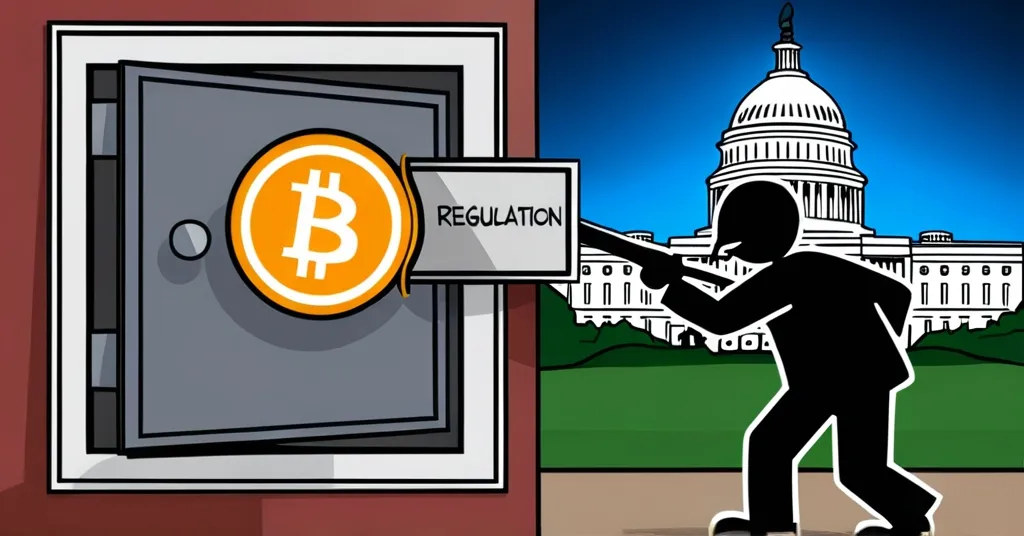US Senate to Confront Crypto Debanking on Feb 5: Key Witnesses and Allegations

US Senate Hearing Set to Tackle Crypto Debanking: Key Witnesses and Allegations
On February 5, 2025, the US Senate will confront the pressing issue of debanking, particularly within the cryptocurrency sector, during a hearing led by the Senate Banking Committee. This session will explore whether banks are cutting off accounts due to regulatory pressure or political bias.
- Hearing Date: February 5, 2025
- Witnesses: Nathan McCauley, Evan Hafer, Stephen Gannon
- Purpose: Investigate debanking and potential government overreach
The Senate Banking Committee, under the leadership of Chairman Tim Scott, is set to address what he describes as “Operation Chokepoint 2.0,” a term used to refer to a controversial initiative aimed at restricting certain businesses from banking services. The hearing will feature testimonies from Nathan McCauley of Anchorage Digital, Evan Hafer of Black Rifle Coffee, and Stephen Gannon, an attorney from DWT Law. Their insights are expected to shed light on the severity of debanking practices and whether these actions are merely a result of banks adhering to regulations or something more sinister.
Simultaneously, the House Oversight Committee, led by James Comer, is delving into related concerns about political bias in banking. Comer has stated, “We’ve heard numerous cases of conservatives being debanked. We want to know if this is banks enforcing ESG (Environmental, Social, and Governance) policies, which we already know are discriminatory, or if the government is stepping in like they did with Twitter and Facebook.” This investigation underscores the broader implications of debanking, affecting not only crypto businesses but also conservatives and other politically sensitive sectors.
Major banks like Bank of America and JPMorgan Chase have vehemently denied any political bias in their account closure decisions. Bank of America asserts, “We never close accounts for political reasons. We are required to follow strict government rules and regulations, which sometimes lead to decisions to exit certain relationships.” Similarly, JPMorgan Chase maintains, “We follow the law. Full stop. Political bias has no place in our policies.” However, the Federal Deposit Insurance Corporation (FDIC) has issued warnings to banks about the risks associated with crypto businesses, which could influence banking decisions.
The Cooper Kirk investigation adds another layer to the debate. It claims that regulators are illegally denying state-chartered banks access to the Federal Reserve system due to their services to crypto clients. This, according to the investigation, is achieved through arbitrary and opaque standards, pressuring banks into closing accounts.
The debanking issue extends beyond the crypto sector, impacting politically exposed persons (PEPs) like Melania Trump, who reportedly faced account closures. PEPs are individuals who hold prominent public positions, and under anti-money laundering (AML) laws, they face increased scrutiny from financial institutions.
This hearing is a crucial moment for the crypto industry, which champions decentralization and privacy. It highlights the tension between regulatory oversight and the freedom to innovate and disrupt. As advocates of effective accelerationism, we recognize the need to confront these challenges head-on to ensure that the future of finance remains open and accessible. While Bitcoin remains at the forefront of this revolution, we must also acknowledge the roles that altcoins and other innovative protocols play in filling niches that even Bitcoin might not serve best.
Key Takeaways and Questions
- What is the purpose of the February 5 hearing?
The hearing aims to investigate the extent of debanking practices, particularly within the cryptocurrency sector, and determine whether banks are cutting off accounts due to political pressures or regulatory guidelines. - Who are the key witnesses at the hearing?
The key witnesses are Nathan McCauley of Anchorage Digital, Evan Hafer of Black Rifle Coffee, and Stephen Gannon of DWT Law. - What allegations are being made against banks?
Banks are accused of unfairly targeting conservatives and businesses in politically sensitive sectors like energy and crypto, potentially due to political bias or regulatory pressure. - How have major banks like Bank of America and JPMorgan Chase responded to these allegations?
Both banks have denied any political bias in their decisions, asserting that they strictly follow government rules and regulations, which may lead to account closures. - What role does the FDIC play in this issue?
The FDIC has issued warnings to banks about the risks of working with crypto businesses, which may influence banking decisions. - What broader issues does the debanking of Melania Trump highlight?
It highlights the increased scrutiny and banking challenges faced by politically exposed persons (PEPs) under anti-money laundering laws. - What is the focus of the Cooper Kirk investigation?
The investigation claims that regulators are illegally denying state-chartered banks access to the Federal Reserve system due to their services to crypto clients, using arbitrary and opaque standards to pressure banks into closing accounts.
As we navigate these complex issues, it’s essential to stay informed about the developments that could shape the future of cryptocurrency and banking practices. The outcome of this hearing could have far-reaching implications, not just for the crypto community but for the broader financial landscape.
“Their combined testimonies are expected to unpack just how bad the debanking issue is—and whether there’s more to this story than banks just following the rules.”
“We’ve heard numerous cases of conservatives being debanked,” Comer said. “We want to know if this is banks enforcing ESG policies, which we already know are discriminatory, or if the government is stepping in like they did with Twitter and Facebook.”
“We never close accounts for political reasons. We are required to follow strict government rules and regulations, which sometimes lead to decisions to exit certain relationships,” – Bank of America
“We follow the law. Full stop. Political bias has no place in our policies,” – JPMorgan
“We should be allowed to tell clients why,” – Jamie Dimon, JPMorgan CEO



